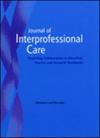Decoding healthcare teamwork: a typology of hospital teams.
IF 1.9
3区 医学
Q3 HEALTH CARE SCIENCES & SERVICES
引用次数: 0
Abstract
The effectiveness of healthcare depends on successful teamwork. Current understanding of teamwork in healthcare is limited due to the complexity of the context, variety of team structures, and unique demands of healthcare work. This qualitative study aimed to identify different types of healthcare teams based on their structure, membership, and function. The study used an ethnographic approach to observe five teams in an English hospital. Data were analyzed using a combined inductive-deductive approach based on the Temporal Observational Analysis of Teamwork framework. A typology was developed, consisting of five team types: structural, hybrid, satellite, responsive, and coordinating. Teams were challenged to varying degrees with staffing, membership instability, equipment shortages, and other elements of the healthcare environment. Teams varied in their ability to respond to these challenges depending on their characteristics, such as their teamworking style, location, and membership. The typology developed in this study can help healthcare organizations to better understand and design effective teams for different healthcare contexts. It can also guide future research on healthcare teams and provide a framework for comparing teams across settings. To improve teamwork, healthcare organizations should consider the unique needs of different team types and design effective training programs accordingly.解码医疗团队合作:医院团队类型学。
医疗保健的有效性取决于成功的团队合作。由于医疗环境的复杂性、团队结构的多样性以及医疗工作的独特需求,目前对医疗团队合作的了解还很有限。这项定性研究旨在根据医疗团队的结构、成员组成和功能来识别不同类型的医疗团队。研究采用人种学方法观察了一家英国医院的五个团队。在团队工作时间观察分析框架的基础上,采用归纳和演绎相结合的方法对数据进行了分析。分析结果表明,团队由五种类型组成:结构型、混合型、卫星型、响应型和协调型。团队在不同程度上面临着人员配置、成员不稳定、设备短缺以及医疗环境其他因素的挑战。团队应对这些挑战的能力各不相同,这取决于他们的特点,如团队工作方式、地点和成员。本研究开发的类型学可以帮助医疗机构更好地理解和设计不同医疗环境下的有效团队。它还可以指导未来有关医疗团队的研究,并为比较不同环境下的团队提供一个框架。为了改善团队合作,医疗机构应考虑不同团队类型的独特需求,并据此设计有效的培训计划。
本文章由计算机程序翻译,如有差异,请以英文原文为准。
求助全文
约1分钟内获得全文
求助全文
来源期刊

Journal of Interprofessional Care
HEALTH CARE SCIENCES & SERVICES-
CiteScore
5.80
自引率
14.80%
发文量
124
审稿时长
6-12 weeks
期刊介绍:
The Journal of Interprofessional Care disseminates research and new developments in the field of interprofessional education and practice. We welcome contributions containing an explicit interprofessional focus, and involving a range of settings, professions, and fields. Areas of practice covered include primary, community and hospital care, health education and public health, and beyond health and social care into fields such as criminal justice and primary/elementary education. Papers introducing additional interprofessional views, for example, from a community development or environmental design perspective, are welcome. The Journal is disseminated internationally and encourages submissions from around the world.
 求助内容:
求助内容: 应助结果提醒方式:
应助结果提醒方式:


